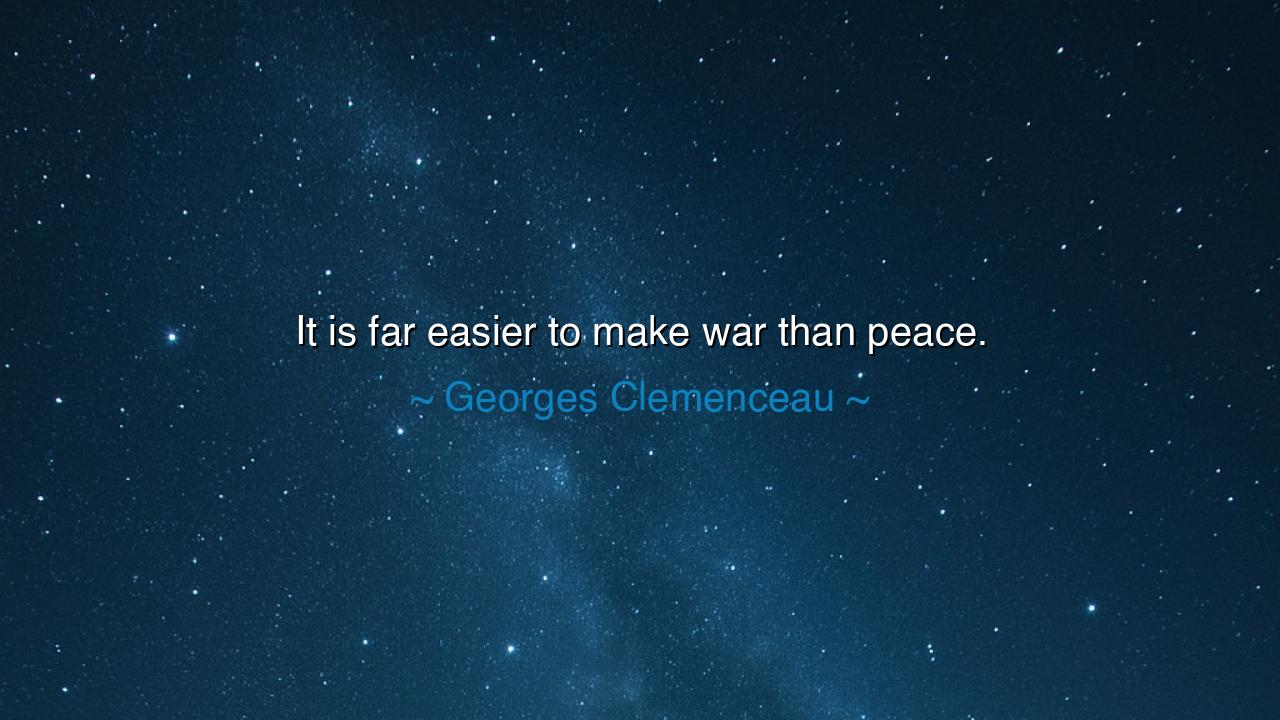
It is far easier to make war than peace.






Georges Clemenceau, the fierce “Tiger of France,” who guided his nation through the firestorm of the First World War, once declared with piercing honesty: “It is far easier to make war than peace.” These words, born not of theory but of the brutal lessons of statesmanship, reveal a truth that has echoed across the centuries. For war springs swiftly from passion, pride, and anger, but peace requires patience, humility, sacrifice, and wisdom. Any fool can ignite conflict, but only the wise can calm its flames.
The ancients knew this law well. In Homer’s Iliad, war erupts in a moment — an insult, a wound to pride, a stolen bride — and from that spark ten years of carnage follow. Yet when the fighting is to end, how many councils, how many envoys, how many rituals must take place before peace is even spoken of? The poet shows us what Clemenceau later confirmed: that the sword is quicker to draw than to sheathe, and the hand that wounds often trembles when asked to heal.
History provides luminous mirrors. Consider the First World War itself, where nations plunged eagerly into combat in 1914, convinced the war would be short, even glorious. But when the guns at last fell silent in 1918, the work of peace proved far harder. Clemenceau, Wilson, and Lloyd George sat in Versailles, attempting to hammer together a settlement. Here the truth of Clemenceau’s words blazed forth: war had been easy, but peace required navigating ambition, vengeance, and distrust. In the end, the treaty they forged was fragile, its flaws birthing another, even greater war.
By contrast, look at the peace built after the Second World War. This time, leaders had learned the bitter lesson of Clemenceau’s truth. They did not merely end the fighting; they invested in the Marshall Plan, in rebuilding, in weaving economic bonds. They created institutions of cooperation, sowing the seeds of lasting stability. Yet even this peace required years of toil, endless negotiation, and the courage to place reconciliation above revenge. Truly, the plow of peace digs deeper furrows than the sword of war ever could.
Children of tomorrow, hear this wisdom: war comes swiftly, like a storm tearing through the land. But peace must be cultivated, like a garden, patiently tended season after season. It is easy to shout, to fight, to divide. It is far harder to listen, to forgive, to unite. Clemenceau’s words remind us that the higher path is not the one that bursts forth in fire, but the one that endures through labor, through patience, through the long work of healing.
The lesson is clear: do not be deceived by the false glory of war. To fight is easy; to reconcile is hard. To destroy is quick; to rebuild is slow. Therefore, honor not those who clamor for conflict, but those who labor for peace. The builders of bridges, not the breakers of swords, are the ones who carry civilization forward.
Practical action flows from this wisdom. In your own life, when conflict arises, do not rush to anger, for that is easy. Instead, strive for peace, even when it is difficult. Seek dialogue before dispute, forgiveness before vengeance, understanding before judgment. On the scale of nations, support those who strive for cooperation, for treaties, for justice, even when their path is long and weary. For though the work of peace is heavy, its fruits are sweeter than any victory in war.
So let it be remembered: “It is far easier to make war than peace.” Clemenceau spoke with the voice of history’s sorrow, yet also with its wisdom. War is the labor of a moment; peace is the work of a lifetime. To choose the harder road is to choose greatness, for only through peace can the world endure and the future find hope.






AAdministratorAdministrator
Welcome, honored guests. Please leave a comment, we will respond soon